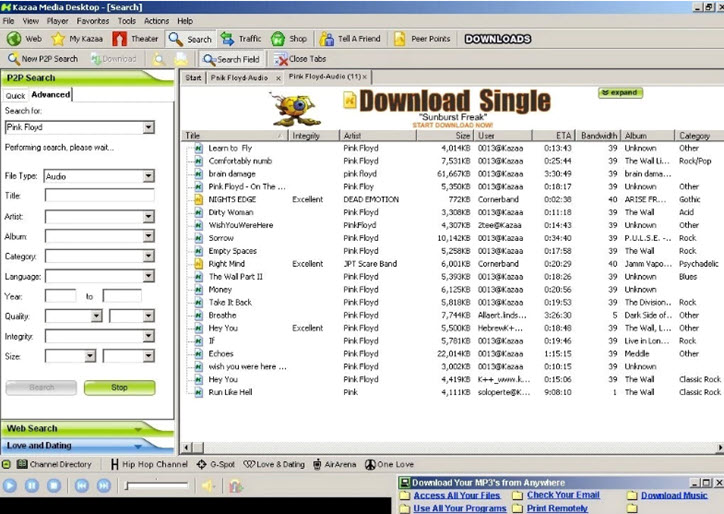Kazaa, founded in 2001, was a popular peer-to-peer file-sharing application that allowed users to share various types of digital content, including music, video files, software applications, e-books, and text files. Originally stylized as "KaZaA", the application is commonly referred to as "Kazaa". Its desktop client was named Kazza Media Desktop, aka KMD.
Official Website: www.kazaa.com
Owned by: Consumer Empowerment, Sharman Networks, Atrinsic
Founded: March, 2001
Founders and Key People: Jaan Tallinn, Janus Friis, Niklas Zennström
Shutdown: August, 2012
Pronounced as: "ka-ZAH"

Initially, Kazaa operated as a P2P file-sharing platform, gaining popularity in the early 2000s. Due to legal challenges, Kazaa faced legal troubles and eventually pivoted into a legitimate licensed subscription service in 2010. While Kazaa enjoyed its moment in the spotlight, it ceased its operations in August 2012.
The History of Kazaa
Kazaa was built with FastTrack protocol, a peer-to-peer (P2P) communications technology that also served iMesh, Grokster, and Morpheus file-sharing programs. FastTrack was a widely known project built by the BlueMoon team, headed by Jaan Tallinn, an Estonian billionaire computer programmer. The team later joined Niklas Zennström from Sweden and Janus Friis from Denmark, and introduced Kazaa in March 2001, under the name of Consumer Empowerment, a Dutch-based company.

It's worth noting that Niklas Zennström and Janus Friis were also the key figures behind Skype and Rdio, an online music streaming service that was active during 2008-2015.
Kazaa and FastTrack were born shortly before Napster – the first generation of P2P networks – shut down in July of that year.
According to BBC News, the Kazaa website boasted more than four million simultaneous users at its peak times, and the desktop software had been downloaded a staggering 239 million times.
In 2002, many users found the Kazaa was bundled with adware, probably as a means for monetization. The spyware was accused of modifying users' browser settings - such as the home page and 404 error page, inserting advertising toolbars, and capturing browsing data.
In response to these issues, unofficial versions of Kazaa emerged, aiming to maintain the functionality of the software while removing all associated malware. Kazaa Lite is the most prominent alternative, it was so popular and even surpassed the official client in terms of user adoption.
In April 2004, CNET's download hub terminated the distribution of the Kazaa.
During its entire life circle, Kazaa faced significant financial penalties due to copyright infringement concerns. The lawsuits tarnished its reputation and affected Kazaa's viability as a business.
Facing the Music: Legal Troubles of Kazaa
During the early 2000s, Sharman Networks faced lawsuits by the Buma/Stemra, the RIAA (Recording Industry Association of America), the MPAA (Motion Picture Association of America), the ARIA (Australian Recording Industry Association), and the UMA (Universal Music Australia Pty Ltd).
In 2001, the Dutch music publishing body Buma/Stemra initiated legal action against Consumer Empowerment, the original company behind Kazaa. The court ruled that Kazaa's owners must take measures to prevent copyright infringement.
In October 2001, the RIAA and the MPAA filed a copyright infringement lawsuit against Kazaa in a federal court in Los Angeles. This lawsuit also included StreamCast Networks (owner of Morpheus) and Grokster, two other major file-swapping companies.
The legal proceedings forced an offshoring of the company, Sharman Networks. It was headquartered in Australia and organized in the offshore jurisdiction of the Republic of Vanuatu, a small island in the South Pacific. Meanwhile, Blastoise, the operator of FastTrack was hosted in another tax haven, a small British-owned island.
Escalated Legal Challenges for Kazaa and Sharman Networks
Following the transfer of Kazza's key assets to Sharman Networks, legal challenges escalated. Various music industry associations and copyright holders pursued lawsuits against Kazaa for facilitating copyright infringement.
In a significant development, a US federal judge ruled that the RIAA and the MPAA can expand the ongoing copyright suit to include this new owner, Sharman Networks. Still, many in the legal community believed that the case was the best chance to establish a legal defense for peer-to-peer technology.
Sharman Networks also expressed confidence in their position, stating that they believed the distribution of the Kazaa Media Desktop was not only legal but also crucial for the future of P2P. They were optimistic that the court would vindicate their legal stance.
Unlike Napster which maintains a central server that helps link file swappers, Sharman, StreamCast and Grokster simply distribute the software used by file traders. They contend that this should shield them from legal liability.
In September 2003, the RIAA filed lawsuits against over 250 individuals, accusing them of illegally distributing about 1,000 copyright music files each, using P2P networks. RIAA sought an average compensation of $3,000 per case.
Cary Sherman, president of the RIAA, claimed that the criterion of the legal action was the number of files being uploaded and shared. RIAA was presenting the five major music labels: Universal Music Group, Sony Music, BMG, EMI, and Warner Music. Sharman Networks countersued, alleging RIAA's violation of Kazaa's terms of use – the former performed the investigation using Kazaa Lite, an unofficial copy.
Kazaa Updated Its Services
Amid the legal battles, Sharman Networks released Kazaa 2.0. This version allows users to download groups of songs as a single item, conduct web searches within the program, and includes a rating feature to avoid downloading corrupted files.

In August, 2003, Sharman Networks and Avalon Online Distribution (AOD) published Kazaa Plus, a $29.95 premium version that offers an ad-free experience, improved search capabilities, and increased download sources. The certified version was exclusively available on www.kazaaplus.com and CNET's downloading hub.

Lawsuits in Australia
In February 2004, the Music Industry Piracy Investigations (MIPI), a division of the Australian Recording Industry Association (ARIA), took legal action against Kazaa. They alleged massive copyright breaches. Later in September, 2005, UMA v. Sharman ruled that the Kazaa network had violated copyright laws in Australia, as the file-swapping program encouraged users to breach copyright. Kazaa was given a two-month deadline to modify their website to prevent further piracy.
The $100 Million Settlement
In July 2006, the MGM Studios, Inc. v. Grokster, Ltd. caused Sharman to settle for $100 million, the amount to compensate the loss of four major music labels – EMI, Sony BMG, Universal Music, and Warner Music. The company also agreed to pay an undisclosed amount to the studios in the industry.
What Then Happened to Kazaa
In Oct. 2010, Kazaa was acquired by Atrinsic, a company that specializes in online advertising and offers subscription products directly to consumers. According to the agreement, Brilliant Digital (the owner of Kazaa at that time) will receive 7.1 million shares of Atrinsic's stock. Brilliant Digital will also maintain ownership of 20% of the profits generated by Kazaa.
In March 2011, Atrinsic launches Kazaa app for the iPad. The app grants subscribers the ability to enjoy unlimited music tracks with a $10 monthly subscription. During the initial week of usage, users can download songs without any charge. Atrinsic shares were up from $3.29 to $3.75 on Nasdaq after the announcement.
In August 2012, the Kazaa website was no longer active.
In fact, the gradual decline of Kazaa began in the mid-2000s, primarily due to the legal battles it faced. As the platform implemented stricter measures to combat copyright infringement, many users migrated to other file-sharing platforms that were less restricted. Meanwhile, the rise of legal streaming services such as iTunes, Spotify, and Netflix further compounded Kazaa's demise.







